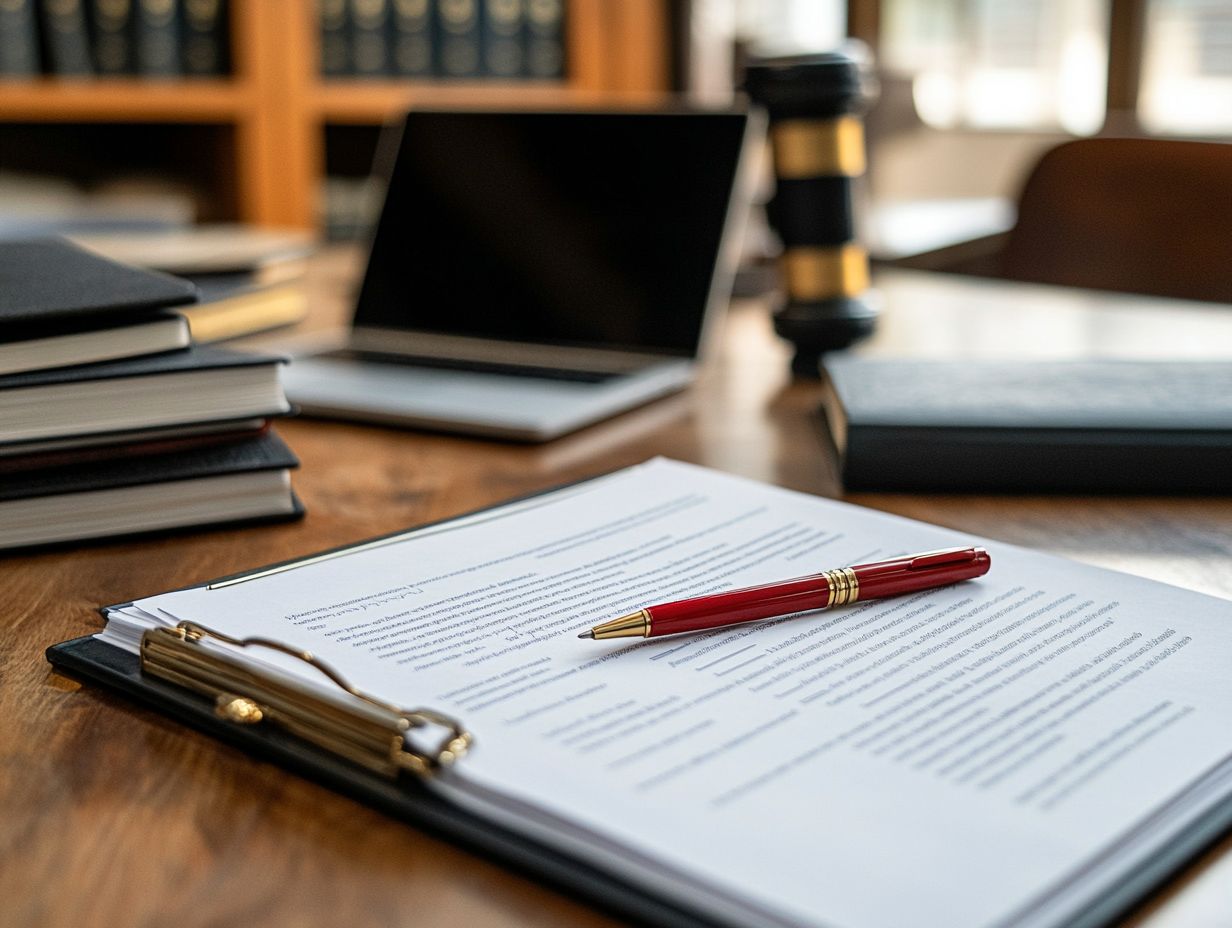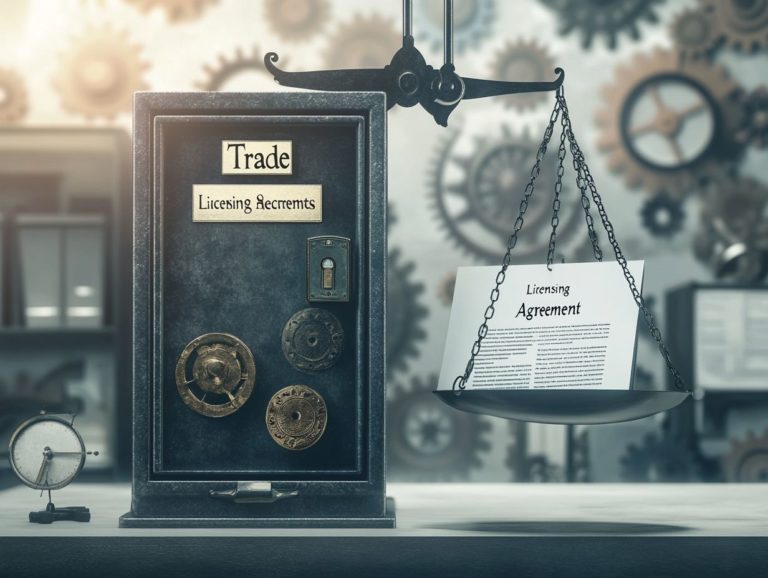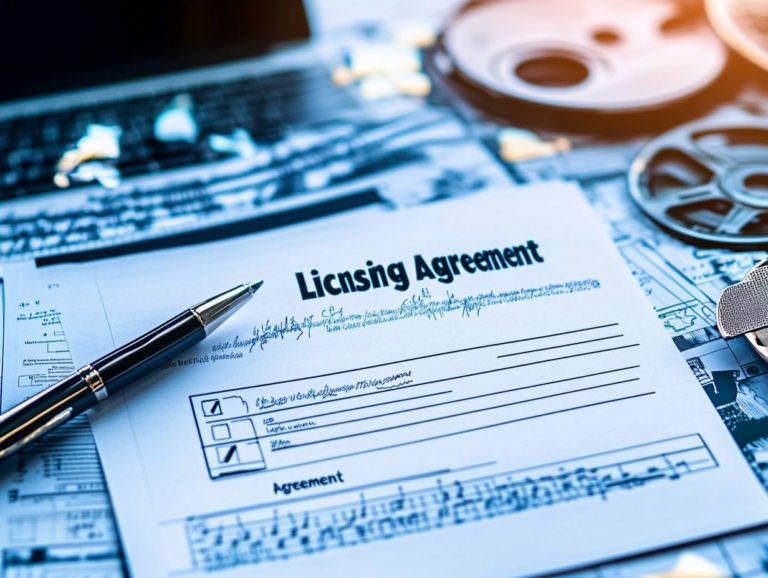Common Mistakes in Licensing Agreements and How to Avoid Them
Licensing agreements can serve as a powerful asset for your business. They enable you to leverage creative works while minimizing associated risks.
However, navigating these agreements isn t always straightforward. Many companies stumble into common pitfalls, such as vague terms or neglecting crucial clauses.
Get ready to explore the essentials of licensing agreements! This article highlights frequent mistakes you should be mindful of and offers practical tips to steer clear of these missteps.
Whether you re just stepping into the world of licensing or aiming to refine your strategy, grasping these key aspects can help safeguard your interests and cultivate successful collaborations.
Contents
- Key Takeaways:
- Understanding Licensing Agreements
- Common Mistakes in Licensing Agreements
- How to Avoid Mistakes in Licensing Agreements
- Frequently Asked Questions
- What are some common mistakes in licensing agreements?
- How can I avoid mistakes in a licensing agreement?
- What should I do if I realize I made a mistake in a licensing agreement?
- What are the consequences of mistakes in a licensing agreement?
- Can hiring a lawyer help me avoid mistakes in a licensing agreement?
- What are other tips for avoiding mistakes in licensing agreements?
Key Takeaways:
- Be clear and specific with the terms and conditions in a licensing agreement to avoid misunderstandings and disputes.
- Consider the rights involved and ensure they are properly addressed in the agreement to protect both parties’ interests.
- Don’t overlook termination and renewal clauses, as they can significantly impact the agreement and the parties involved.

Understanding Licensing Agreements
Understanding licensing agreements is essential for businesses and individuals aiming to navigate the intricate landscape of rights over creative works.
A licensing agreement is a legally binding contract that outlines the terms under which you can utilize someone else s creative works, encompassing trademarks, copyrights, and patents. This contract sets the stage for financial terms, royalty payments, and compliance monitoring, ensuring that all parties adhere to the agreed-upon standards.
Well-crafted licensing agreements can boost your brand reputation and streamline the negotiation process. They enable innovative uses of the licensed property while safeguarding the rights of the creative works’ owner.
What is a Licensing Agreement?
A licensing agreement is a contract that grants you the right to use someone else’s creative works, such as trademarks, copyrights, and patents, under specific conditions.
These agreements are essential for fostering collaboration and innovation across various industries. They allow you to leverage existing resources effectively.
At the core of every licensing agreement are several key elements:
- Financial terms outline your economic responsibilities, detailing upfront payments and ongoing royalty payments that compensate the creative works’ owner.
- Compliance requirements ensure that you adhere to certain standards and do not misuse the creative works.
By setting clear expectations and protecting the interests of both parties, licensing agreements promote fair use while driving market growth.
Common Mistakes in Licensing Agreements
Navigating the intricacies of licensing agreements can be challenging. To avoid pitfalls, it’s essential to know how to negotiate a licensing agreement effectively, as several common mistakes could jeopardize the success of these arrangements.
One prevalent issue lies in the absence of clear definitions, which may lead to misunderstandings about terms and conditions. Failing to include comprehensive termination clauses or performance standards may leave both parties exposed in the event of disputes.
Overlooking the significance of due diligence could result in financial obligations that might have been negotiated more favorably.
Lack of Clear Terms and Conditions

Vague language often leads to misunderstandings and disputes between the parties involved. This is particularly true when each side interprets their obligations and rights in different ways.
If financial obligations aren’t clearly defined, one party might unexpectedly shoulder costs or responsibilities that weren’t anticipated during negotiations. Similarly, ambiguity around performance standards can result in unmet expectations, where one side believes they ve fulfilled their duties while the other feels there has been a breach of compliance.
To protect your interests and ensure seamless business operations, it s essential to have a well-defined licensing agreement. This agreement should include precise terminology that outlines every aspect of governance, effectively preventing potential legal pitfalls.
Failure to Consider Intellectual Property Rights
Neglecting to address intellectual property rights in licensing agreements can lead to serious legal troubles and conflicts. Both parties must clearly outline their trademark rights to protect brand identity throughout the agreement.
Recognizing patent claims is equally crucial. These legal protections keep others from using your innovations without permission. By addressing these issues proactively, you can minimize disputes and foster a productive relationship.
Understanding how these rights impact the overall dynamics of the agreement like negotiation power and revenue sharing can significantly enhance the strategic value of the partnership. Ultimately, this safeguards the interests of both parties involved.
Ignoring Termination and Renewal Clauses
Neglecting the termination and renewal clauses in a licensing agreement can lead to problems that could harm your interests. These clauses define the duration of the agreement and outline the conditions for termination or renewal.
By establishing these parameters, you create a framework that enhances compliance monitoring. This helps you adhere to agreed-upon standards and avoid potential violations.
Well-defined termination clauses serve as a roadmap for conflict resolution. They enable you to navigate disputes with a clear understanding of your rights and obligations. These components also help build a professional relationship, ensuring issues can be addressed systematically.
How to Avoid Mistakes in Licensing Agreements
Avoiding pitfalls in licensing agreements requires a proactive strategy that emphasizes expert guidance and careful negotiation. To stay informed, familiarize yourself with the essential clauses in licensing agreements you must know. Act now to prevent costly errors in licensing agreements.
Consulting with a legal professional can clarify the complexities of financial terms, performance clauses, and government regulations. By engaging in a thorough negotiation process and exercising due diligence, you protect the interests of all parties involved.
This approach not only leads to a more equitable compensation package but also minimizes risks tied to the agreement. It opens up exciting opportunities for collaboration!
Consulting with Legal Professionals

Consulting with legal professionals is crucial in drafting and finalizing licensing agreements. This ensures compliance and protects your interests. These experts provide invaluable insights into the legal jargon embedded in such documents, facilitating smoother negotiations.
Having qualified attorneys by your side allows both parties to navigate the intricate web of regulations. This ensures all terms are fair and clearly defined. With professional guidance, ongoing compliance monitoring becomes significantly easier, helping you avoid costly disputes in the future.
Thoroughly Reviewing and Negotiating Terms
Thoroughly reviewing and negotiating the terms of a licensing agreement can greatly reduce misunderstandings. This process safeguards everyone’s interests, enabling you to understand the financial terms, including royalties (payments made for the use of your work), payments, and any associated fees.
Performance clauses clearly articulate the expectations and obligations each party must meet. This creates a framework for accountability.
Engaging in comprehensive due diligence during this review uncovers potential risks and ensures compliance with local regulations. By addressing these crucial elements early on, you can cultivate a collaborative partnership and significantly enhance the likelihood of long-term success.
Regularly Updating and Monitoring Agreements
Regularly updating and monitoring your licensing agreements is essential. This ensures compliance and minimizes disputes.
This proactive approach promotes responsibility. It also enhances the effectiveness of your operations.
By revisiting these agreements, you can spot inconsistencies. This helps align them with current regulations and standards.
Maintaining agreements allows for quicker resolutions when disputes arise. Protecting relationships fosters smoother business operations.
Frequently Asked Questions
What are some common mistakes in licensing agreements?

Common mistakes include not reading the agreement thoroughly and failing to define the scope of the license. To avoid these pitfalls, it’s important to know how to protect your rights in a licensing agreement and consider the potential consequences of the agreement.
How can I avoid mistakes in a licensing agreement?
Carefully review all terms and conditions. Clearly define the scope of the license to prevent misunderstandings.
What should I do if I realize I made a mistake in a licensing agreement?
If you spot a mistake, address it quickly. Contact the other party to discuss it openly. You may be able to amend the agreement.
What are the consequences of mistakes in a licensing agreement?
Mistakes can lead to legal disputes, financial losses, and damage to relationships. You may also risk losing important intellectual property rights.
Can hiring a lawyer help me avoid mistakes in a licensing agreement?
Yes, a lawyer specializing in licensing agreements can help. They know how to review and negotiate terms to protect your interests.
What are other tips for avoiding mistakes in licensing agreements?
Communicate clearly with the other party. Conduct thorough research on the license and understand its implications. Ensure all parties agree to the terms before signing.






